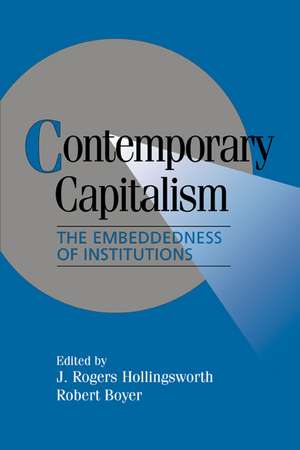Contemporary Capitalism: The Embeddedness of Institutions: Cambridge Studies in Comparative Politics
Editat de J. Rogers Hollingsworth, Robert Boyeren Limba Engleză Paperback – 27 feb 1999
Toate formatele și edițiile
| Toate formatele și edițiile | Preț | Express |
|---|---|---|
| Paperback (1) | 298.27 lei 43-57 zile | |
| Cambridge University Press – 27 feb 1999 | 298.27 lei 43-57 zile | |
| Hardback (1) | 711.86 lei 43-57 zile | |
| Cambridge University Press – 27 mar 1997 | 711.86 lei 43-57 zile |
Din seria Cambridge Studies in Comparative Politics
-
 Preț: 233.13 lei
Preț: 233.13 lei -
 Preț: 267.61 lei
Preț: 267.61 lei -
 Preț: 239.36 lei
Preț: 239.36 lei -
 Preț: 185.64 lei
Preț: 185.64 lei -
 Preț: 160.82 lei
Preț: 160.82 lei -
 Preț: 206.52 lei
Preț: 206.52 lei - 9%
 Preț: 594.68 lei
Preț: 594.68 lei -
 Preț: 225.70 lei
Preț: 225.70 lei -
 Preț: 164.94 lei
Preț: 164.94 lei -
 Preț: 206.71 lei
Preț: 206.71 lei -
 Preț: 236.42 lei
Preț: 236.42 lei -
 Preț: 358.38 lei
Preț: 358.38 lei -
 Preț: 231.82 lei
Preț: 231.82 lei -
 Preț: 257.82 lei
Preț: 257.82 lei -
 Preț: 264.74 lei
Preț: 264.74 lei -
 Preț: 269.58 lei
Preț: 269.58 lei -
 Preț: 201.24 lei
Preț: 201.24 lei -
 Preț: 232.45 lei
Preț: 232.45 lei -
 Preț: 203.42 lei
Preț: 203.42 lei -
 Preț: 191.12 lei
Preț: 191.12 lei -
 Preț: 158.77 lei
Preț: 158.77 lei -
 Preț: 199.05 lei
Preț: 199.05 lei -
 Preț: 288.80 lei
Preț: 288.80 lei -
 Preț: 388.29 lei
Preț: 388.29 lei -
 Preț: 288.04 lei
Preț: 288.04 lei - 11%
 Preț: 695.06 lei
Preț: 695.06 lei - 11%
 Preț: 553.80 lei
Preț: 553.80 lei -
 Preț: 262.06 lei
Preț: 262.06 lei - 11%
 Preț: 691.66 lei
Preț: 691.66 lei -
 Preț: 228.00 lei
Preț: 228.00 lei -
 Preț: 385.28 lei
Preț: 385.28 lei -
 Preț: 312.89 lei
Preț: 312.89 lei -
 Preț: 224.44 lei
Preț: 224.44 lei -
 Preț: 287.07 lei
Preț: 287.07 lei -
 Preț: 251.27 lei
Preț: 251.27 lei -
 Preț: 313.70 lei
Preț: 313.70 lei -
 Preț: 277.38 lei
Preț: 277.38 lei -
 Preț: 423.79 lei
Preț: 423.79 lei - 11%
 Preț: 552.94 lei
Preț: 552.94 lei - 11%
 Preț: 554.43 lei
Preț: 554.43 lei - 14%
 Preț: 783.26 lei
Preț: 783.26 lei - 11%
 Preț: 584.04 lei
Preț: 584.04 lei -
 Preț: 228.60 lei
Preț: 228.60 lei
Preț: 298.27 lei
Nou
Puncte Express: 447
Preț estimativ în valută:
57.08€ • 59.37$ • 47.12£
57.08€ • 59.37$ • 47.12£
Carte tipărită la comandă
Livrare economică 14-28 aprilie
Preluare comenzi: 021 569.72.76
Specificații
ISBN-13: 9780521658065
ISBN-10: 0521658063
Pagini: 512
Dimensiuni: 153 x 229 x 36 mm
Greutate: 0.7 kg
Ediția:Revised
Editura: Cambridge University Press
Colecția Cambridge University Press
Seria Cambridge Studies in Comparative Politics
Locul publicării:New York, United States
ISBN-10: 0521658063
Pagini: 512
Dimensiuni: 153 x 229 x 36 mm
Greutate: 0.7 kg
Ediția:Revised
Editura: Cambridge University Press
Colecția Cambridge University Press
Seria Cambridge Studies in Comparative Politics
Locul publicării:New York, United States
Cuprins
Part I: 1. Coordination of economic actors and social systems of production Rogers Hollingsworth and Robert Boyer; Part II: Introduction: the variety of institutional arrangements and their complementarity in modern economics Rogers Hollingsworth and Robert Boyer; 2. The variety and unequal performance of markets Robert Boyer; 3. A typology of cooperative interorganizational relationships and networks Jerald Hage and Catherine Alter; 4. Weathering the storm: associational governance in a globalizing era William Coleman; 5. Constitutional orders: trust building and response to change Charles F. Sabel; Part III: Introduction: how and why do social systems of production change? Robert Boyer and Rogers Hollingsworth; 6. Beneficial constraints: on the economic limits of rational voluntarism Wolfgang Streeck; 7. Flexible specialization: theory and evidence in the analysis of industrial change; 8. Globalization, variety and mass production: the metamorphosis of mass production in the new competitive age Benjamin Coriat; 9. Continuities and changes in social systems of production: the cases of Japan, Germany, and the United States Rogers Hollingsworth; Part IV: Introduction: levels of spatial coordination and the embeddedness of institutions Philippe Schmitter; 10. Perspectives on globalization and economic coordination Wyn Grant; 11. Globalization in question: international economic relations and forms of public governance Paul Hirst and Grahame Thompson; 12. The formation of international regimes in the absence of a Hegemon: clubs are trump Lorraine Eden and Fen Osler Hampson; 13. The emerging Euro-polity and its impact upon national systems of production Philippe Schmitter; Part V: Conclusion: from national embeddness to spatial and institutional nestedness Robert Boyer and Rogers Hollingsworth.
Recenzii
"This is a stimulating set of essays produced by a distinguished set of contributors." Michael Smith, Canadian Journal of Political Sciences
"This valuable and rich collection of essays challenges the assumption of the self-adjusting market on three major grounds: first, by arguing that economic activity is coordinated bye several different institutional mechanisms and that a variety of capitalist models exist, as opposed to the idea of a single one; second, by stressing Karl Polanyi's notion of the embededness of economic institutions...third, by showing that specific forms of economic coordination are more likely to be used at some level of society...than at others." American Jrnl of Sociology
"This volume brings together a range of important and influential contributions from various disciplines in which this new institutional analysis has been applied." Comparative Labor Law & Policy Journal
"This valuable and rich collection of essays challenges the assumption of the self-adjusting market on three major grounds: first, by arguing that economic activity is coordinated bye several different institutional mechanisms and that a variety of capitalist models exist, as opposed to the idea of a single one; second, by stressing Karl Polanyi's notion of the embededness of economic institutions...third, by showing that specific forms of economic coordination are more likely to be used at some level of society...than at others." American Jrnl of Sociology
"This volume brings together a range of important and influential contributions from various disciplines in which this new institutional analysis has been applied." Comparative Labor Law & Policy Journal
Descriere
This book argues there is no single best institutional arrangement for organizing modern societies.















